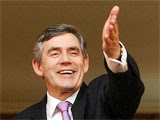(CBS/AP) Russian President Vladimir Putin is in Maine, a houseguest at the Bush family home in Kennebunkport, Maine, enjoying the local seafood and blueberries and a speedboat ride with President Bush and Mr. Bush's father, former President Bush.
That's the lighter side of the Bush-Putin summit, a meeting with the very serious aim of easing tensions in the U.S.-Russian relationship.
The two presidents may kick off the day Monday with an early morning fishing trip before moving on to official business in what is being called an "informal" meeting.
CBS News correspondent Mark Knoller says this summit is not expected to produce any new treaties or other major agreements, but the two leaders do have important issues to discuss.
(CBS/AP) Sunday night, the Bush family hosted a dinner for Putin, featuring a cornucopia of local specialties – lobster and swordfish representing Maine's fishing heritage, and for dessert, blueberry and pecan pie.
Blueberries are Maine's most famous fruit and the pecan is the state tree of Texas, another home state for President Bush, a former governor of that state.
Putin's arrival in the area sparked demonstrations by protesters who are calling for the impeachment of President Bush. The protesters Sunday marched to within a half mile of the site of the Bush-Putin summit.
Protesters chanting slogans including "Impeach now, impeach now!" carried colorful signs and pulled a wagon with a 7-foot-tall replica of the Statue of Liberty in a coffin, representing the perceived loss of liberties under the Bush administration.
The crowd estimated by police at 1,700 criticized both world leaders – President Bush for the war in Iraq and President Putin for the hard line his government has taken against separatists in Chechnya.
Four demonstrators wearing orange jumpsuits, like those worn by detainees at the U.S. Navy base in Guantanamo Bay, Cuba, kneeled on the ground near a police roadblock. Two demonstrators who crossed the police line were arrested.
Jamilla El-Shafei, one of the organizers, said Presidents George W. Bush and Putin have inflamed tensions that are already running high in the Muslim world. In particular, she zeroed in on Bush and Vice President Cheney over their handling of the war in Iraq.
"We want the troops home now. We want permanent bases out of Iraq. And we want to hold Bush and Cheney accountable for deceiving the people into an immoral and unjust war, for mutilation of the Constitution and the evisceration of habeas corpus," she said.
The protest began Sunday morning at Kennebunkport's Village Green, a park with many tourist shops and restaurants.
The demonstration was organized by the Kennebunk Peace Department and the Maine Campaign to Impeach. But demonstrators represented a wide variety of causes that included ending the genocide in Darfur, fighting corporate greed and improving the environment.
The event featured music, chants and speeches before demonstrators and a small marching band paraded down Ocean Avenue toward the Bush home at Walker's Point.
Included in the demonstration was a rolling memorial for Marine Lance Cpl. Alexander Arredondo, who was killed in Iraq on Aug. 25, 2004. His father's pickup truck had a flag-draped coffin with Arredondo's boots and camouflage shirt bearing a purple heart.
"This is my pain. This is my loss," said Carlos Arredondo, who became so upset when he learned of his son's death in Hollywood, Fla., that he tried to destroy a military van and was burned in the process. He now lives in the Boston area.
The demonstrators' main target was President Bush, whose unpopular policy in Iraq has come under widespread and growing criticism.
"Outrage and anger isn't enough," said John Kaminski of Maine Lawyers for Democracy, a group of 80 attorneys pushing for impeachment proceedings. "We have a job to do and that job is to hold this administration accountable and take this country back."
But some protesters didn't spare Putin, who came into office as the Chechnya conflict was flaring. Critics have accused him of human rights violations in suppressing mostly Muslim, separatist rebels in the breakaway region.
Victoria Poupko, who moved from Moscow to Boston 17 years ago, said the two presidents are "both criminals" for torture, war crimes and abuse of power, among other things. She carried a sign that said, "Stop imperialism. Bush out of Iraq. Putin out of Chechnya."
"Withdraw from Chechnya, let them have their independence," she said.
While marching down Ocean Avenue, the group encountered a couple of dozen counter-demonstrators waving signs in support of President Bush. One of them jumped into the parade and shouted slogans, shouting at one point "Liars, liars, liars!"
The event was peaceful but two demonstrators who insisted on crossing a police line on Ocean Avenue were arrested and charged with trespassing.
"I pay taxes. I can walk on the street if I want to," one of the protesters, Lynn Curit-Smith of Portland, told Kennebunkport Police Chief Joseph Bruni before crossing the line with two others, one of whom was released because she was a minor.
Mr. Bush, Knoller reports, wants to win Putin's backing for tougher U.N. sanctions on Iran to pressure it to end its nuclear weapons program. The two are also likely to talk about their differences on the subject of a missile defense system in Europe and the issue of independence for Kosovo.
In January, the U.S. said it plans to build a missile defense system based in the Czech Republic and Poland. Russia, however, indicated it is not persuaded by the argument that the system targets a possible future threat from Iranian nuclear missiles. The Kremlin threatened to aim missiles at Europe and denounced the U.S. as an irresponsible source of force.
At a summit last month of world economic powers, Putin surprised President Bush by proposing that the system instead use an old Soviet-era radar facility in Azerbaijan instead of the Czech and Polish sites. It is an idea that U.S. officials do not want to reject outright. But they have concluded it would not work as a substitute, only perhaps as an early warning supplemental component.
On Iran, Mr. Bush is seeking Putin's backing for a third round of penalties against Tehran for defying U.N. orders to halt uranium enrichment. Iran says the enrichment is intended for a nuclear energy program. The West suspects Iran wants to develop nuclear bombs.
The U.S. has begun discussing with Security Council members a proposal to require all nations to inspect cargo for illicit nuclear-related shipments or arms coming from or going to Iran and to freeze assets of a number of Iranian banks, a senior administration official. The official spoke on condition of anonymity because the talks are in their initial stages.
Russia and China previously have balked at such measures, supporting more modest penalties that have had little effect. But there are signs the Kremlin may now be in a more cooperative mood.
Sunday, President Bush waited at his family's Maine seacoast estate as his father, former President Bush, met Putin at a nearby airport and rode with the Russian leader in a helicopter to the compound. Emerging from a limousine, Putin handed large bouquets of flowers to first lady Laura Bush and former first lady Barbara Bush, then kissed them on both cheeks.
"It's pretty casual up here — unstructured," said President Bush, referring to the setting for his talks with Putin.
President Bush knows what he wants from the visit: Convince Putin that a U.S. missile defense system in Eastern Europe would not threaten Russia. Bring the Kremlin behind tough new penalties aimed at Iran's suspected nuclear weapons program. Generally defrost relations.
What the Russian president seeks is less clear.
Putin requested an audience with President Bush before going to Guatemala, where Olympic officials are picking a host city for the 2014 winter games.
"Does Putin have something he plans to throw at Bush's feet?" wondered Sarah Mendelson, Russia policy expert and senior fellow at the Center for Strategic and International Studies.
Both sides have insisted there is no set agenda and scant potential for announcements. With expectations lowered and an itinerary that amounts to little more than three meals, a meeting and maybe some fishing, Mendelson only somewhat jokingly termed it "the no-summit summit."
Before leaving for the U.S., Putin said his "very good, I would say friendly" relations should create a positive atmosphere. "If it wasn't that way, I wouldn't go, and I wouldn't have been invited," he said. "In politics, as in sports, there is always competition."









